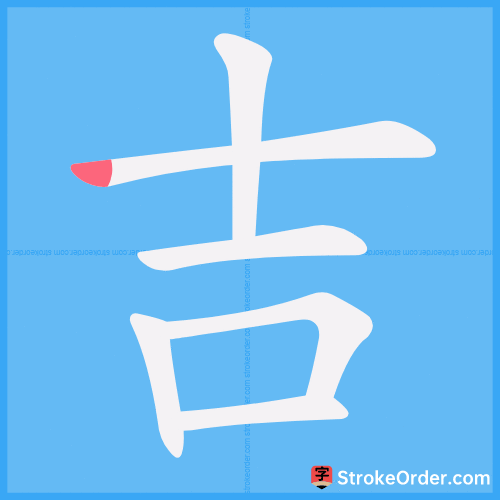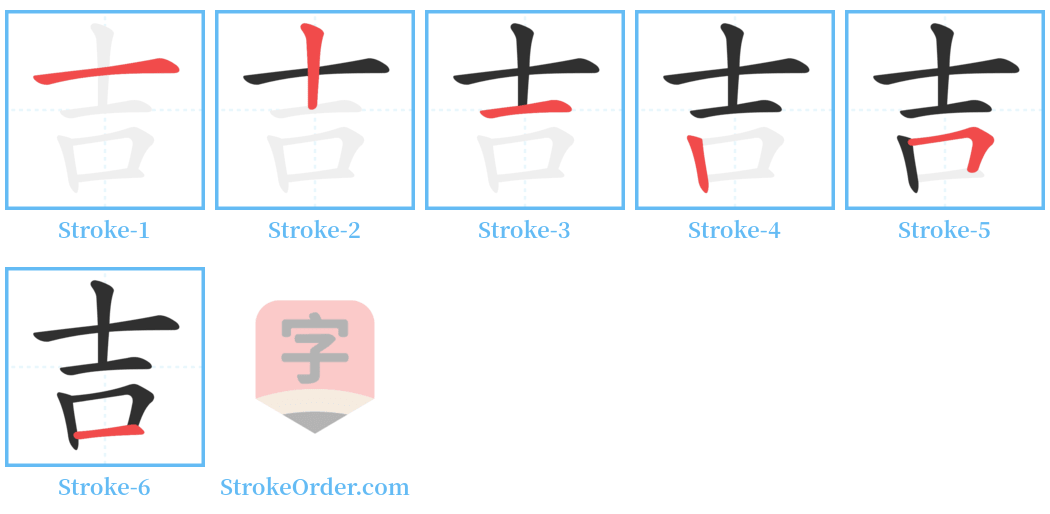吉 Stroke Order
Animated Stroke Order of 吉

Stroke Order Diagrams for 吉

Step-by-Step Handwriting Guide for 吉

Learn to Write Chinese Characters with Video Tutorials
Watch the video of writing the Chinese character "吉", learn the correct stroke order (笔顺) of the character "吉", and master the standard way of writing the character "吉".
Free Printable Handwriting Practice with Stroke Order: 吉
Printable Writing Practice Worksheet of "吉" in Portrait Orientation (Tian Zi Ge)

Printable Writing Practice Worksheet of "吉" in Landscape Orientation (Tian Zi Ge)

Information of 吉
Pinyin
jí
Radical
口
Strokes
6 strokes
Usage
★★★★★
Definition
lucky
吉 (jí)
Meaning:
1. Good, beneficial, happy; opposite of "凶" (xiōng), which means ominous.
- Expressions: 吉利 (lucky), 吉祥 (auspicious), 逢凶化吉 (turn misfortune into good fortune), 吉光片羽 (rare and precious cultural artifacts).
2. An auspicious day.
- Example: 择吉 (choose a lucky day).
3. Goodness, virtue, beauty.
- Example: 吉利人 (a good and talented person), 吉人天相 (a virtuous person receives heavenly assistance).
4. Abbreviation for Jilin Province in China.
- Example: 吉剧 (Jilin drama).
5. A surname.
吉 (jí) as an adjective:
- Original meaning: auspicious; beneficial.
- Etymology: Created by combining elements signifying weapons and the vessel that holds them, meaning the containment of weapons to reduce warfare and ensure the safety of the people.
Synonyms:
1. Same original meaning (lucky).
2. 吉服 (traditional ceremonial garments), 吉帖 (wedding invitation), 吉谶 (foretell auspicious omens), 吉羊 (auspicious sheep; often inscribed on ancient artifacts), 吉卜 (lucky divination signs), 吉幸 (good fortune), 吉征 (lucky omen).
3. Goodness; virtue (good).
吉 (jí) as a noun:
1. The first day of the lunar month.
- Example: 吉月 (the first day of the lunar month).
2. A wedding, typically including accompanying celebrations.
- Example: 吉席 (wedding banquet); 吉期 (wedding date).
3. Ancient sacrificial rites; one of the five types of rites (吉, 凶, 宾, 军, 嘉).
- Example: 吉巳 (a ritual day); 吉典 (sacrificial rites).
4. An ancient prefecture name; established during the Sui Dynasty and continued through the Tang, Five Dynasties, Song, and Qing Dynasties; now located in Ji'an City, Jiangxi Province.
5. An onomatopoeic word.
- Example: 吉蹬蹬 (sound of horse hooves), 吉丁 (the crisp sound of jade), 吉丁当 (sound of metal clashing), 吉丢古堆 (sound of turbulent waves).
Ji'an prefecture-level city in Jiangxi / also Ji'an County / Ji'an or Chi'an township in Hualien County 花蓮縣|花莲县[Hua1 lian2 Xian4], east Taiwan
Input Method for 吉
Pinyin
ji2
Wubi
fkf
Cangjie
gr
Zhengma
bjvv
Four Corner
40601
Unicode
U+5409
Same Pronunciation Characters